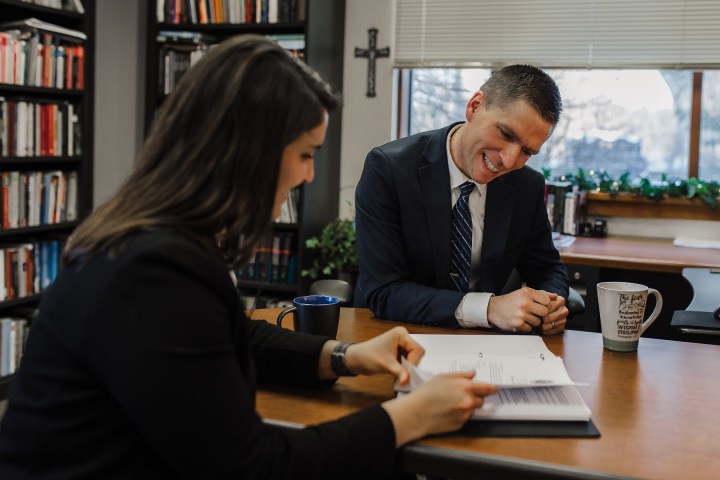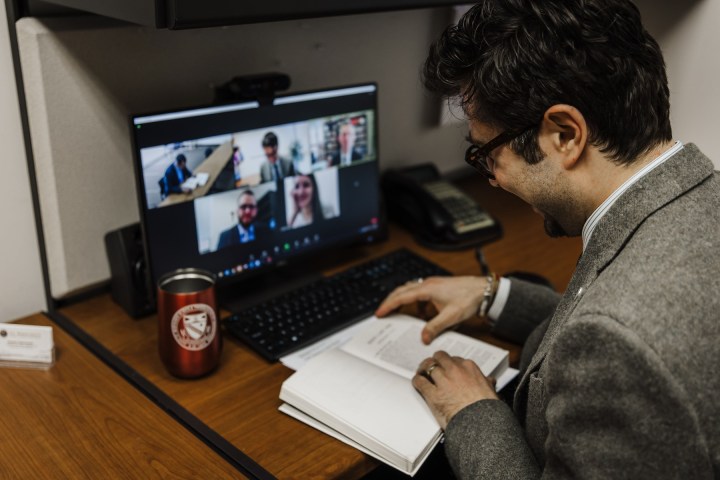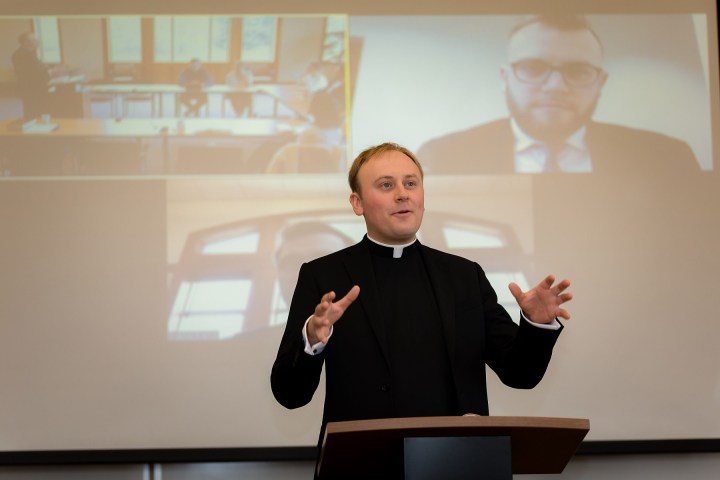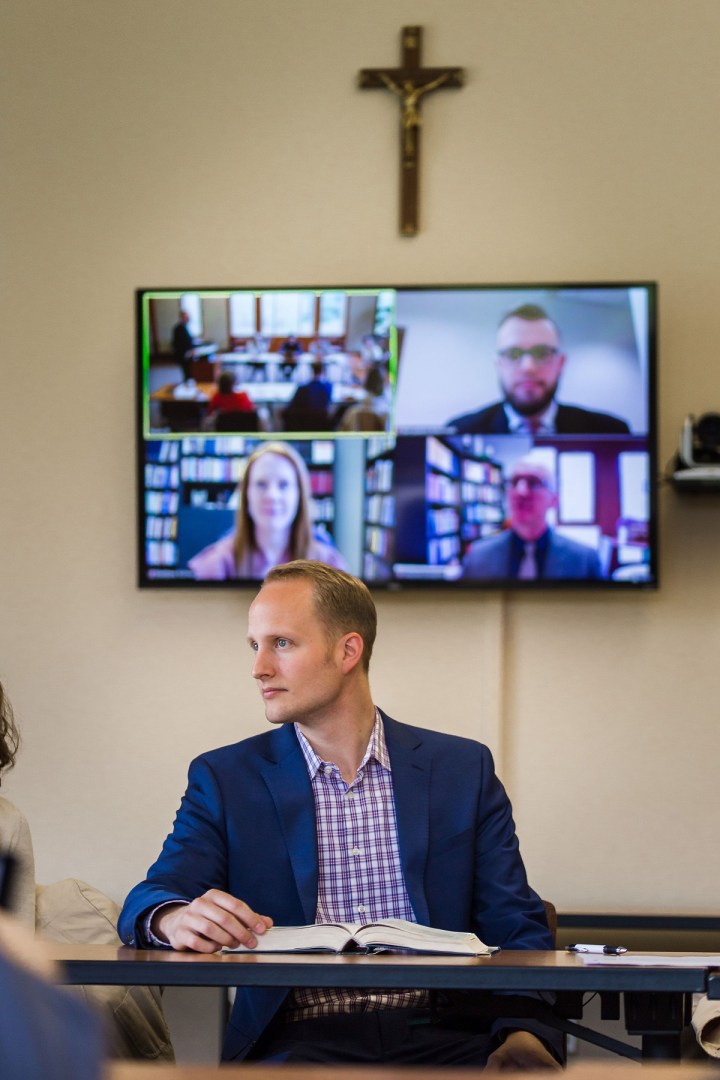As the world pandemic moves into its third year, one Catholic graduate school is making it easier than ever to make the most of our time at home. St. Bernard’s School of Theology and Ministry is opening courses for free auditing from now until April 29. The program is supported by a variety of distance learning methods which make it easier than ever to pursue one’s education from home.
St. Bernard’s
Located in Rochester, NY, St. Bernard’s is a storied Catholic institution that has been educating theologians in one form or another for over 100 years. At its inception, in 1893, it was a seminary and it became one of the first seminaries in the U.S. to begin educating members of the laity. Their original campus is still standing in Northern Rochester and it is protected on the National Register of Historic Places.
In 2003, the campus moved to a new location, still in Rochester, but much better suited to fit the needs of their students for generations to come. The grounds, which can be seen in many shots on the video above, features a beautiful landscape, complete with cherry blossoms. Their chapel is equally as alluring, with a full bay window of brilliant stained glass flanking the sanctuary.
Diversity of Vocations
St. Bernard’s classes draw students from all walks of life, whether their calling is to the priesthood or the permanent diaconate or if they seek to serve the Church as a lay person. There, students preparing for Holy Orders learn beside lay graduate and certificate students. Because of this variety, classroom discussions offer unique perspectives from a wide range of Catholic experiences.

Dr. Matthew Kuhner, Academic Dean and Vice President of St. Bernard’s aptly explains:
“When you come to study with us, you’ll find that classes are made up of people preparing for all different dimensions of ministry. So when you come, you’ll find you’re sitting next to someone who wishes to be a lay ecclesial minister. You’ll also be sitting next to someone who is a diaconate candidate, or you could be sitting next to someone who is a pre-seminarian on their way to presbyteral ordination.”
Students of St. Bernard’s can enjoy a smaller, closely knit community that cares for the spiritual welfare of their students and challenges them to explore their faith and vocations. There are no auditorium sized classes where students gather in such great numbers that the professors can’t remember names. Rather, the staff makes an effort to get to know everyone.
In their promotional video, featured above, Rev. Peter Van Lieshout, adjunct professor of theology, explains that his consideration for his students does not end after class:
“St. Bernard’s is a small community, so it allows us to work individually with students. I care about the spiritual life of my students. I’m a priest, right? Day in and day out I’m hearing confessions. I’m saying Mass. So I want my students to be holy.”
Theology and Ministry
St. Bernard’s maintains that the study of theology is not a purely academic pursuit, but a calling that must be practiced. As such, they seek to unite theology, prayer, and sanctity. To this end, they teach that theology is something that is pursued through Christ, and their lovely campus keeps prayer ever present. The chapel is right down the hall from their classrooms and it draws in the entire St. Bernard’s community (students, faculty, and staff) for prayer.
Dr. Matthew Kuhner again exceptionally illustrates St. Bernard’s call to vocational discernment as he poses the question:
“Today I ask you: What is the Lord calling you to in terms of knowledge of Him? Is He calling you to study? To come to know the teachings of His church on a deeper level than you have before? If so, we’re here to help at St. Bernard’s and we’ll gladly direct you in any way we can.”
Free Auditing
When the world pandemic began in 2020, St. Bernard’s decided to make their educational efforts more accessible than ever. Equipped with a variety of methods to make distance learning more convenient, they also opened their summer classes for free auditing.

To audit a course means that one may attend classes and gain access to all course material, but receive no academic credit for the course and are not expected to complete course assignments. This arrangement is ideal for those who wish to take a class while not pursuing a degree, or for those who would like to explore some options before settling on a field of study. It is also a great way to stimulate one’s mind and faith devotions during another summer of the pandemic.
St. Bernard’s has already seen fantastic results in their free audit program. In the summers of 2020 and 2021, they had a total of 334 students participate. These came from countries around the world, including Canada, Turkey, Indonesia, Scotland, Croatia, India, Slovakia, France, Saint Lucia, South Africa, and Wales. It should be noted that at this time St. Bernard’s classes are currently only provided in English.
Summer Courses
In the Summer of 2022, St. Bernard’s is offering 10 courses that are available for audit. On their website, they highlight several classes that they feel will be of particular interest for those auditing:
Tolkien the Artist: Creativity & the Image of God, for example, will examine the role of creativity in human life, through the works and thoughts of beloved Catholic author J. R. R. Tolkien. Taught by Siobhan Latar, S.T.L., a genuine Tolkien expert, the course will identify what the author’s understanding of the role of creativity shows us about our relationship with creation, ourselves, and God the Creator. This class takes place during their first summer session, between May and June.

Another worthy class to audit, this time in the second session, is Beauty, Liturgy, Glory: Towards a Philosophical and Theological Aesthetics. This course explores the nature of aesthetic experience, the relationship between truth, goodness, and beauty, and the role of beauty in liturgy. The course comes with the added bonus of being run by Dr. Stephen Loughlin, St. Bernard’s President, Dr. Matthew Kuhner, St. Bernard’s Vice President, and Rev. Peter Van Lieshout, co-director of Vocations for the Diocese of Rochester. In this class, auditing students have the chance to learn from St. Bernard’s top leadership in a one-of-a-kind opportunity.
There are many more classes to explore in St. Bernard’s lineup for the summer of 2022. Click here to peruse the whole list.
Distance Learning
St. Bernard’s has a beautiful campus, as can be seen in the video above, but they acknowledge that only about 20% of their students are in-person. In order to accommodate these students to the best of their ability, they’ve raised the bar on distance learning. Now, St. Bernard’s offers three different methods of joining classes from afar: Video Conferencing, Online Instruction, and a Hybrid approach.
Video Conferencing
Synchronous video conferencing is a feature most of us are familiar with by now. Whether you’re in school, a non-essential worker, or keeping distance over the holidays, chances are you’re most familiar with Zoom and other such programs after two years of pandemic restrictions. It is an efficient way to attend classes without leaving the comfort of one’s own home. Currently every one of St. Bernard’s courses that are available in-person are also open for video conferencing.

St. Bernard’s faculty pride themselves on creating an in-person feel for their distance learners. Students who attend through video conferencing are ever present in the classroom, put up on a screen for the whole room to see. Teachers go out of their way to make sure these students are engaged and participate in conversations with the rest of the class. In this, they have created a unique atmosphere that gives the most authentic educational experience for everyone.
Online Instruction
Asynchronous Online Instruction is an excellent feature for those who wish to take a course but have trouble fitting it into a busy schedule. It is rather different from video conferencing, in that students would not be tuning in at the same time as everyone else. Online instruction utilizes a learning management system called Canvas, which is used through web browsers.
Through Canvas, students receive a guided approach to move through course materials. While it doesn’t offer the same in-class participation as Video Conferencing, St. Bernard’s goes out of their way to make sure it is just as engaging. They describe it as “quite expansive, ranging from one that is completely text-based and non-interactive, to one that combines diverse interactive elements like video instruction, virtual classrooms, and discussion boards, etc.”
Hybrid
St. Bernard’s recognizes that these two methods of distance learning may not suit all of their students, and so they also offer a third option, Hybrid Instruction. This allows students to mix and match aspects of Video Conferencing and Online Instruction to fit their individual needs.
This is especially convenient for those who would really like to attend classes via Video Conferencing, but are unable to make every class. It is also helpful for students who chose Online Instruction, but would like to attend a Video Conference or two to better connect with their classmates.
St. Bernard’s School of Theology and Ministry’s free audit program is open for registration until April 29. Click here to see all of the fascinating courses you can take to bring yourself closer to your Catholic faith.
